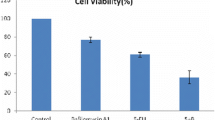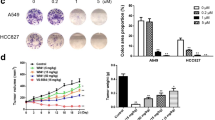Abstract
Purpose
Gemcitabine has been used as a therapeutic drug combined with cisplatin for the treatment of lung cancer patients. However, the prognosis is poor due to acquired resistance. Accumulating studies have revealed that autophagy may contribute to the drug resistance. Therefore, the present study is aimed to clarify the mechanisms underlying gemcitabine-acquired resistance.
Methods
SPC-A1 and A549 cells were incubated with gemcitabine followed by assessment of cell viability with MTT assays. GFP-LC3 transient transfection, MDC staining, and transmission electron microscopy were used to detect the change of autophagy at morphological level. Flow cytometry was used to monitor the effect of 3-MA on gemcitabine-induced apoptosis. Western blot analysis was used to detect the expression of p62, LC3, Beclin-1, ATG5, activated caspase 3, Bax, BNIP3, BNIP3L, and Bcl-2.
Results
Our study showed that gemcitabine significantly induced both autophagy and apoptosis in human lung cancer cells SPC-A1 and A549. Of interest was that when autophagy was inhibited by 3-MA, the gemcitabine-induced apoptosis was effectively enhanced, suggesting that gemcitabine can activate autophagy to impair the chemosensitivity of lung cancer cells. Furthermore, the inhibition of autophagy by 3-MA further increased the expression of activated caspase 3, Bax, BNIP3, and BNIP3L, all are critical apoptotic mediators. Contrarily, 3-MA treatment further decreased the expression of Bcl-2, which is an important anti-apoptotic protein.
Conclusion
Our study indicated that autophagy protected human lung cancer cells from gemcitabine-induced apoptosis, and the combined use of gemcitabine and an autophagic inhibitor in lung cancer patients may be an effective therapeutic strategy.





Similar content being viewed by others
References
Parkin DM, Bray F, Ferlay J, Pisani P (2005) Global cancer statistics. CA Cancer J Clin 55(2):74–108
Liu TG, Huang Y, Cui DD, Huang XB, Mao SH, Ji LL, Song HB, Yi C (2009) Inhibitory effect of ginsenoside Rg3 combined with gemcitabine on angiogenesis and growth of lung cancer in mice. BMC Cancer 9:250
Toschi L, Cappuzzo F (2009) Gemcitabine for the treatment of advanced nonsmall cell lung cancer. Onco Targets Ther 2:209–217
Yoneyama H, Takizawa-Hashimoto A, Takeuchi O, Watanabe Y, Atsuda K, Asanuma F, Yamada Y, Suzuki Y (2015) Acquired resistance to gemcitabine and cross-resistance in human pancreatic cancer clones. Anticancer Drugs 26(1):90–100
Mani J, Vallo S, Rakel S, Antonietti P, Gessler F, Blaheta R, Bartsch G, Michaelis M, Cinatl J, Haferkamp A et al (2015) Chemoresistance is associated with increased cytoprotective autophagy and diminished apoptosis in bladder cancer cells treated with the BH3 mimetic (−)-Gossypol (AT-101). BMC Cancer 15(1):224
Maiuri MC, Zalckvar E, Kimchi A, Kroemer G (2007) Self-eating and self-killing: crosstalk between autophagy and apoptosis. Nat Rev Mol Cell Biol 8(9):741–752
Wu HM, Jiang ZF, Ding PS, Shao LJ, Liu RY (2015) Hypoxia-induced autophagy mediates cisplatin resistance in lung cancer cells. Sci Rep 5:12291
Degenhardt K, Mathew R, Beaudoin B, Bray K, Anderson D, Chen G, Mukherjee C, Shi Y, Gelinas C, Fan Y et al (2006) Autophagy promotes tumor cell survival and restricts necrosis, inflammation, and tumorigenesis. Cancer Cell 10(1):51–64
White E (2007) Role of the metabolic stress responses of apoptosis and autophagy in tumor suppression. Ernst Scher Found Symp Proc 4(4):23–34
Francois A, Marchal S, Guillemin F, Bezdetnaya L (2011) mTHPC-based photodynamic therapy induction of autophagy and apoptosis in cultured cells in relation to mitochondria and endoplasmic reticulum stress. Int J Oncol 39(6):1537–1543
O’Donovan TR, O’Sullivan GC, McKenna SL (2011) Induction of autophagy by drug-resistant esophageal cancer cells promotes their survival and recovery following treatment with chemotherapeutics. Autophagy 7(5):509–524
Liu D, Yang Y, Liu Q, Wang J (2011) Inhibition of autophagy by 3-MA potentiates cisplatin-induced apoptosis in esophageal squamous cell carcinoma cells. Med Oncol 28(1):105–111
Zhou Y, Sun K, Ma Y, Yang H, Zhang Y, Kong X, Wei L (2014) Autophagy inhibits chemotherapy-induced apoptosis through downregulating Bad and Bim in hepatocellular carcinoma cells. Sci Rep 4:5382–5390
Lum JJ, Bauer DE, Kong M, Harris MH, Li C, Lindsten T, Thompson CB (2005) Growth factor regulation of autophagy and cell survival in the absence of apoptosis. Cell 120(2):237–248
Codogno P, Meijer AJ (2005) Autophagy and signaling: their role in cell survival and cell death. Cell Death Differ 12(Suppl 2):1509–1518
Mizushima N, Klionsky DJ (2007) Protein turnover via autophagy: implications for metabolism. Annu Rev Nutr 27:19–40
Terman A, Brunk UT (2005) Autophagy in cardiac myocyte homeostasis, aging, and pathology. Cardiovasc Res 68(3):355–365
Papandreou I, Lim AL, Laderoute K, Denko NC (2008) Hypoxia signals autophagy in tumor cells via AMPK activity, independent of HIF-1, BNIP3, and BNIP3L. Cell Death Differ 15(10):1572–1581
Zou H, Zhuo L, Han T, Hu D, Yang X, Wang Y, Yuan Y, Gu J, Bian J, Liu X et al (2015) Autophagy and gap junctional intercellular communication inhibition are involved in cadmium-induced apoptosis in rat liver cells. Biochem Biophys Res Commun 459(4):713–719
Tang JY, Dai T, Zhang H, Xiong WJ, Xu MZ, Wang XJ, Tang QH, Chen B, Xu M (2014) GDC-0980-induced apoptosis is enhanced by autophagy inhibition in human pancreatic cancer cells. Biochem Biophys Res Commun 453(3):533–538
Notte A, Ninane N, Arnould T, Michiels C (2013) Hypoxia counteracts taxol-induced apoptosis in MDA-MB-231 breast cancer cells: role of autophagy and JNK activation. Cell Death Dis 4:e638–e650
Parkin DM, Ferlay J, Curado MP, Bray F, Edwards B, Shin HR, Forman D (2010) Fifty years of cancer incidence: CI5 I–IX. Int J Cancer 127(12):2918–2927
Pasqualetti G, Ricciardi S, Mey V, Del Tacca M, Danesi R (2011) Synergistic cytotoxicity, inhibition of signal transduction pathways and pharmacogenetics of sorafenib and gemcitabine in human NSCLC cell lines. Lung Cancer 74(2):197–205
Pardo R, Lo Re A, Archange C, Ropolo A, Papademetrio DL, Gonzalez CD, Alvarez EM, Iovanna JL, Vaccaro MI (2010) Gemcitabine induces the VMP1-mediated autophagy pathway to promote apoptotic death in human pancreatic cancer cells. Pancreatology 10(1):19–26
Klionsky DJ, Abdelmohsen K, Abe A, Abedin MJ, Abeliovich H, Acevedo Arozena A, Adachi H, Adams CM, Adams PD, Adeli K et al (2016) Guidelines for the use and interpretation of assays for monitoring autophagy. Autophagy 12(1):1–222
Sridhar S, Botbol Y, Macian F, Cuervo AM (2012) Autophagy and disease: always two sides to a problem. J Pathol 226(2):255–273
Gozuacik D, Kimchi A (2004) Autophagy as a cell death and tumor suppressor mechanism. Oncogene 23(16):2891–2906
Augustin S, Berard M, Kellaf S, Peyri N, Fauvel-Lafeve F, Legrand C, He L, Crepin M (2009) Matrix metalloproteinases are involved in both type I (apoptosis) and type II (autophagy) cell death induced by sodium phenylacetate in MDA-MB-231 breast tumour cells. Anticancer Res 29(4):1335–1343
Chen M, He M, Song Y, Chen L, Xiao P, Wan X, Dai F, Shen P (2014) The cytoprotective role of gemcitabine-induced autophagy associated with apoptosis inhibition in triple-negative MDA-MB-231 breast cancer cells. Int J Mol Med 34(1):276–282
Papademetrio DL, Cavaliere V, Simunovich T, Costantino S, Campos MD, Lombardo T, Kaiser CM, Alvarez E (2014) Interplay between autophagy and apoptosis in pancreatic tumors in response to gemcitabine. Target Oncol 9(2):123–134
Li J, Hou N, Faried A, Tsutsumi S, Takeuchi T, Kuwano H (2009) Inhibition of autophagy by 3-MA enhances the effect of 5-FU-induced apoptosis in colon cancer cells. Ann Surg Oncol 16(3):761–771
Ko H, Kim YJ, Park JS, Park JH, Yang HO (2009) Autophagy inhibition enhances apoptosis induced by ginsenoside Rk1 in hepatocellular carcinoma cells. Biosci Biotechnol Biochem 73(10):2183–2189
Feng X, Liu X, Zhang W, Xiao W (2011) p53 directly suppresses BNIP3 expression to protect against hypoxia-induced cell death. EMBO J 30(16):3397–3415
Hui KK, Kanungo AK, Elia AJ, Henderson JT (2011) Caspase-3 deficiency reveals a physiologic role for Smac/DIABLO in regulating programmed cell death. Cell Death Differ 18(11):1780–1790
Acknowledgments
This work was supported by grants from the National Nature Science Foundation of China (No. 81270082; No. 81300027), Nature Science Foundation of Anhui Province (No. 1408085KML25), Doctoral research foundation of the First Affiliated Hospital of Anhui Medical University (No. 3101005002442), Program for the Youth Distinguished Talents of Anhui Medical University, and Key Lab of Geriatric molecular medicine of Anhui Province (No. 1206c0805028).
Author information
Authors and Affiliations
Corresponding author
Ethics declarations
Conflict of interest
The authors have no conflict of interest to declare.
Rights and permissions
About this article
Cite this article
Wu, HM., Shao, LJ., Jiang, ZF. et al. Gemcitabine-Induced Autophagy Protects Human Lung Cancer Cells from Apoptotic Death. Lung 194, 959–966 (2016). https://doi.org/10.1007/s00408-016-9936-6
Received:
Accepted:
Published:
Issue Date:
DOI: https://doi.org/10.1007/s00408-016-9936-6




